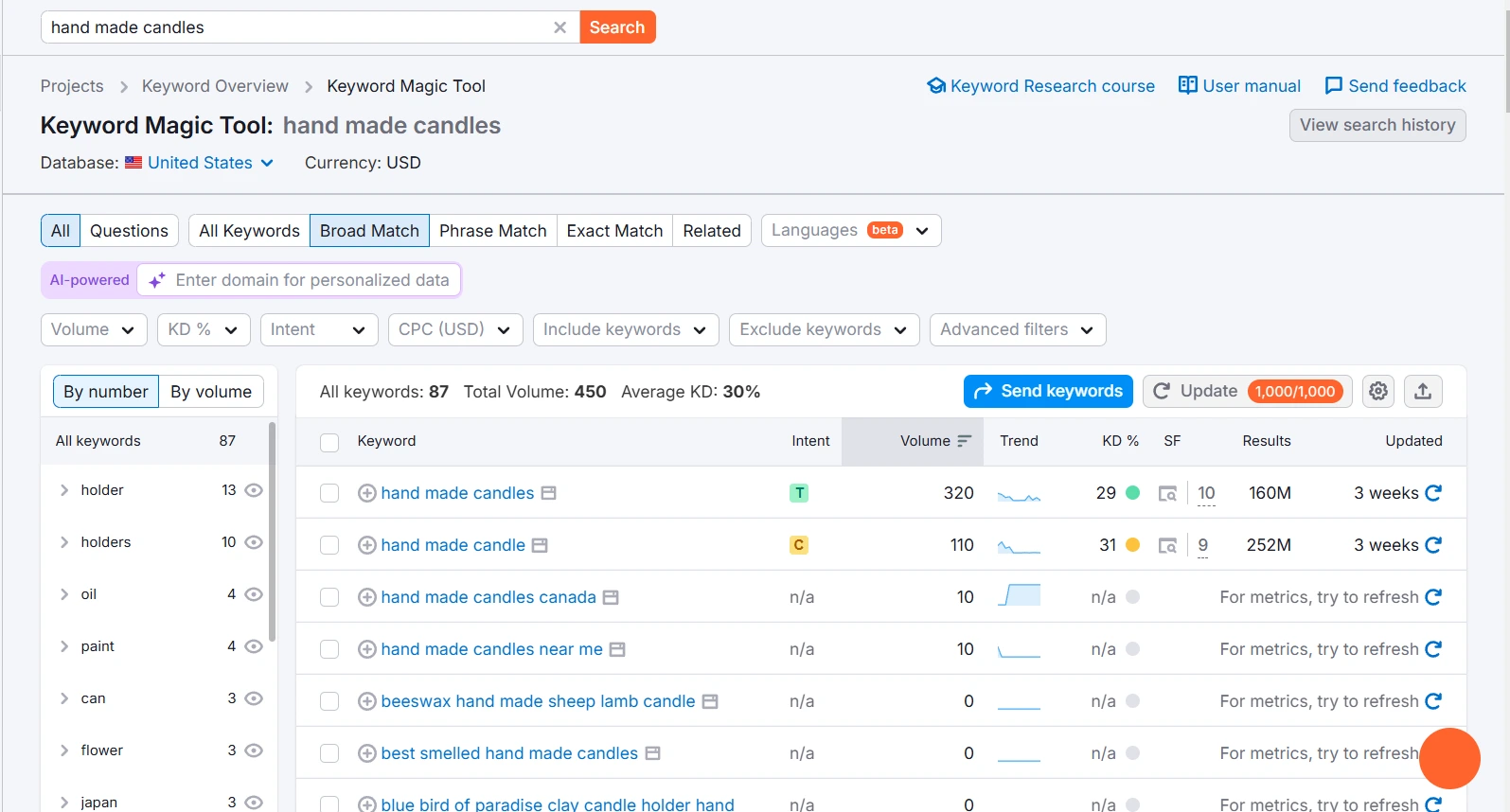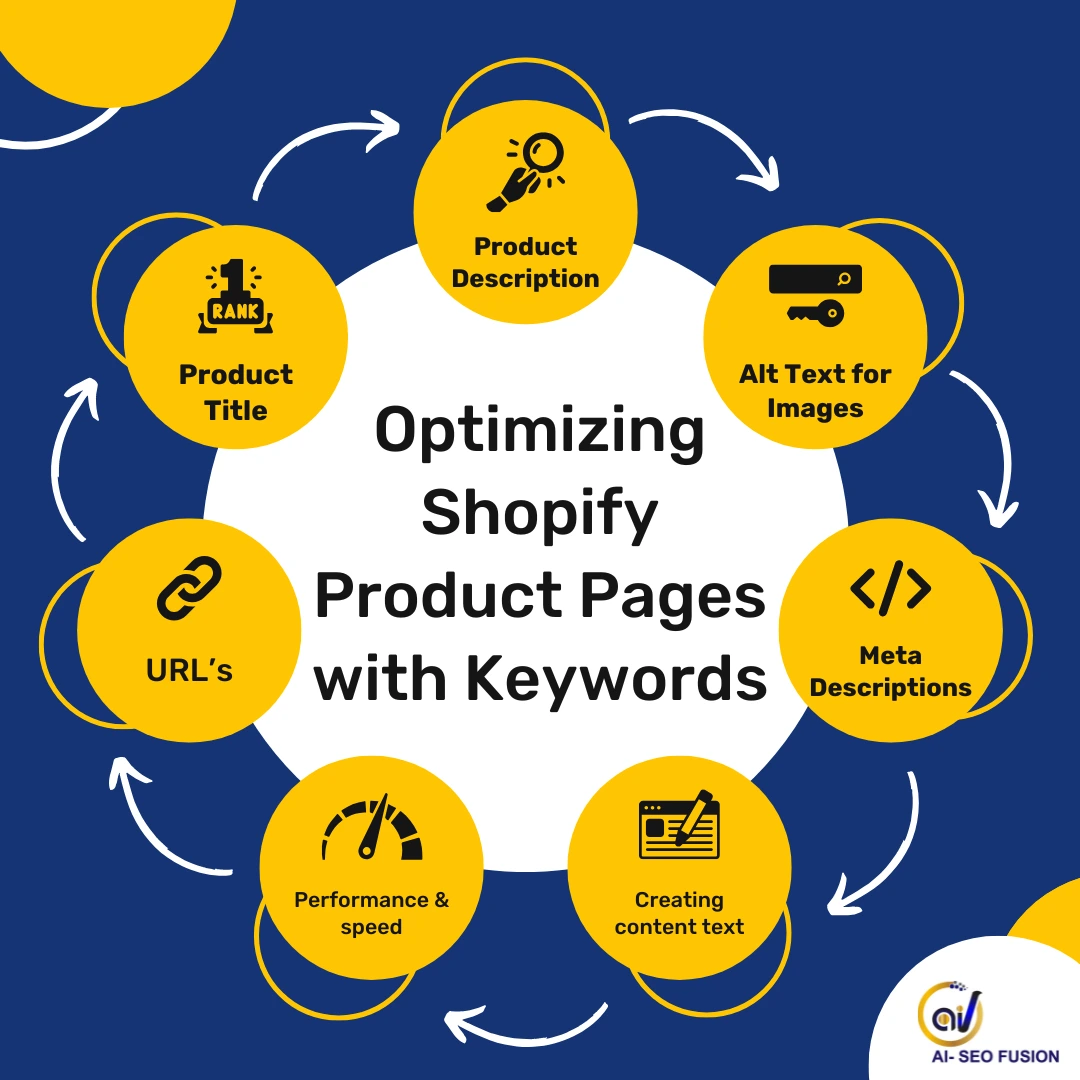How to Perform Keyword Research for Shopify Products - Expert Tips & Strategies
Table of Contents

If you’ve ever dived into the world of e-commerce, you know that succeeding on platforms like Shopify requires more than just listing your products. To stand out in a crowded marketplace, effective Shopify Keyword Research is crucial.
Whether you’re running a boutique or a larger Shopify store, understanding how to use keywords can make all the difference. It’s not just about getting traffic; it’s about attracting the right kind of visitors who are likely to purchase your products.
Effective keyword research is a core pillar of Shopify SEO, and this is where Shopify SEO experts come in. They help optimize product listings and pages to rank higher in search engines, ultimately leading to increased organic traffic and sales.
This guide will break down the essential steps for performing keyword research for your Shopify products. We’ll also introduce you to various services that can assist you, like Shopify SEO services, Shopify tech support, and specialized agencies that are experts in Shopify SEO.
Understanding the Importance of Keyword Research for Shopify Products
Keyword research is the process of identifying the terms and phrases that potential customers use when searching for products similar to yours.
The better you understand what users are searching for, the better you can align your Shopify product pages to meet their needs.
In e-commerce, the right keywords can determine whether a product sells or gets lost in the digital crowd. Incorporating Shopify SEO Services and utilizing professional Shopify consulting can lead to significant improvements in your Shopify store’s performance.
How Shopify Keyword Research benefits your Store?
The primary benefits of performing thorough Shopify keyword research products include:
- Improved Search Engine Rankings: By targeting the right keywords, your products and Shopify store can rank higher on search engines like Google, which leads to increased organic traffic.
- Better Customer Targeting: Understanding what your audience is searching for helps you refine your product offerings and marketing strategies to meet their needs.
- Increased Conversions: When you optimize your product listings using keywords that align with search intent, visitors are more likely to find exactly what they’re looking for and make a purchase.
Step-by-Step Guide: How to Perform Keyword Research for Shopify Products
1. Brainstorm Relevant Keywords
- Think of words and phrases your customers might use to search for your products.
- Focus on terms related to your products, niche, and target audience.
2. Start with a Seed List of Keywords
The first step in Shopify keyword research is identifying a basic list of potential keywords related to your products. These could include general product names, categories, or specific features.
examples of seo keywords are, if you’re selling handcrafted candles, start with seed keywords like “handmade candles,” “soy candles,” or “scented candles.”
You can expand this seed list by thinking about the different variations and long-tail keywords that customers might use to find your products.
For example, instead of just “handmade candles,” customers might search for “best handmade candles for gifts” or “eco-friendly scented candles.”

3. Use Shopify SEO Tools to Analyze Keywords
Once you have a seed list, it’s time to dig deeper using tools that provide valuable data on search volume, competition, and keyword difficulty. Some useful tools include:
- Google Keyword Planner: A free tool that helps you discover keyword volume and trends.
- Ubersuggest: This SEO tool offers keyword suggestions, search volume data, and keyword difficulty ratings.
- SEMrush: Known for its comprehensive keyword analysis, SEMrush provides insights into search volume, competition, and related keywords.
Additionally, if you are working with a Shopify SEO agency or a Shopify expert SEO, they will have access to advanced tools to refine your keyword list further and discover high-potential terms.
3. Analyze Competitors
A key part of keyword research for Shopify products is looking at what your competitors are doing. Find top-performing competitors within your niche and examine their product pages.
Pay attention to the keywords they’re targeting and the structure of their product descriptions.
Some of the tools mentioned above also allow you to perform competitor research. Tools like SEMrush and Ahrefs allow you to enter a competitor’s URL and see what keywords they rank for. This strategy can uncover opportunities you may not have considered.
4. Understand Search Intent
Not all keywords are created equal. It’s important to focus on search intent—the reason behind a user’s search. For Shopify products, search intent can generally be broken into three categories:
- Transactional: Users are ready to purchase, for example, “buy eco-friendly candles.”
- Informational: Users are looking for information or solutions, e.g., “what is the best wax for candles?”
- Navigational: Users are looking for a specific website or product, like “Soy Candle Shop.”
Focusing on transactional keywords for product pages is crucial. However, targeting informational keywords can also help you create valuable content that attracts visitors and builds authority, leading to more organic traffic.
5. Incorporate Long-Tail Keywords
Long-tail keywords are longer, more specific keyword phrases that typically have lower competition and higher conversion rates.
For example, instead of targeting “candles,” a long-tail keyword might be “best scented candles for relaxation.”
These keywords are highly valuable in Shopify stores because they’re more specific to a user’s needs and indicate strong purchase intent. Using long-tail keywords also improves your chances of ranking on Google for niche searches.
Refine Your Keyword List
Once you’ve gathered a list of potential keywords, it’s time to filter and refine them. You’ll want to prioritize keywords that:
- Have a reasonable search volume but aren’t too competitive.
- Align with your Shopify store’s brand and product offerings.
- Match the search intent of your target audience.
As you’re refining your keyword list, you may want to consult a Shopify consultant or Shopify marketing agency for expert guidance on which keywords will be most effective for your business.
Best Practices for Optimizing Shopify Product Pages with Keywords
Once you have your keywords, the next step is adding keywords to your Shopify store. Here are some key areas to focus on:
- Product Titles: Ensure that the primary keyword for each product appears in the title.
- Product Descriptions: Write clear and engaging product descriptions that incorporate keywords naturally.
- Alt Text for Images: Since Shopify stores are highly visual, make sure to use relevant keywords in your image alt text to help with SEO.
- Meta Descriptions: Create compelling meta descriptions that include your main keywords to improve click-through rates.
- URLs: Use clean, descriptive URLs that include relevant keywords for each product.
- Collection Names: Optimize collection titles to match product categories and include related keywords.
- Page Titles and Headers: Add relevant keywords to your website page titles and headings for better SEO.
You can also consider running a Shopify SEO audit to identify any potential issues on your store’s pages and improve them.
What are some important considerations in Shopify Keyword research?
- Local SEO: If targeting a specific geographic area, incorporate local keywords.
- Regular updates: Keep your keyword research ongoing and adjust your strategy based on performance data.
- Content creation: Utilize blog posts and other content to target related keywords and attract more traffic.

Utilizing Expert Services to Improve Your Shopify Keyword Research
If you find the process overwhelming, there are plenty of Shopify SEO services and Shopify SEO experts that can assist you in refining your strategy. A Shopify SEO specialist can help you focus on the best-performing keywords while optimizing your store for long-term success.
If you’re running a service-based business, partnering with an agency experienced in Shopify for service business can help you create a strong online presence.
Whether you’re a Shopify Plus SEO user or just getting started, an expert can provide valuable insights and actionable strategies.
Common Mistakes to Avoid in Keyword Research for Shopify Products
Even the most experienced store owners can fall into certain traps during keyword research. Here are some common mistakes to watch out for:
- Ignoring Search Intent: Focusing only on high-volume keywords without considering the user’s intent can lead to low conversions.
- Overstuffing Keywords: Using keywords too often can make your content sound unnatural and can be penalized by search engines.
- Neglecting Long-Tail Keywords: These keywords are often the most valuable but are frequently overlooked.
- Forgetting Mobile Optimization: Ensure that your keyword strategy also caters to mobile users, as many Shopify shoppers browse and purchase on mobile devices.
Conclusion
Performing effective keyword research for Shopify products is an ongoing process that requires time, attention, and a deep understanding of your target market.
Whether you’re managing your own store or working with a Shopify SEO agency or Shopify expert SEO, staying focused on the right keywords can help drive more traffic and increase sales.
By using the tools, strategies, and services mentioned in this article, you can improve your product visibility and ensure your Shopify store is optimized for success.
With the right keyword strategy, Shopify can become the platform that fuels your online business growth.
Frequently Asked Questions
How can I improve my Shopify store’s SEO?
Improving your Shopify store’s SEO involves conducting keyword research, optimizing product pages, using clean URLs, and creating compelling content. Working with a Shopify SEO agency or Shopify SEO expert can also accelerate results.
What are long-tail keywords and why should I use them?
Long-tail keywords are longer, specific keyword phrases that often have lower competition and higher conversion rates. They are essential for targeting niche audiences and increasing the relevance of your product pages.
How do I know which keywords are right for my Shopify store?
Start with broad seed keywords related to your products and use keyword tools to analyze search volume, competition, and relevance. Consult a Shopify consultant or Shopify marketing agency for expert guidance.
Do I need to hire a Shopify SEO expert for keyword research?
While you can perform keyword research on your own, hiring a Shopify SEO expert can help you uncover high-potential keywords, improve your strategy, and save time.
Can a Shopify SEO audit help my store’s performance?
Yes, a Shopify SEO audit can identify issues that may be hindering your store’s SEO performance and help you implement improvements to increase visibility and sales.
How do I rank for international keywords on Shopify?
If you’re targeting international markets, consider using Shopify international SEO strategies like creating localized content and translating product descriptions to better serve international audiences.
How to find keywords for Shopify?
- Use Keyword Research Tools: Leverage tools like Google Keyword Planner, SEMrush, or Ahrefs to find relevant keywords for your store.
- Analyze Search Engine Ranking Pages (SERP): Study the top-ranking pages for your target keywords to understand what works and identify opportunities.
- Use Google Keyword Planner: Find high-volume, low-competition keywords specifically for your Shopify store.
- Explore Google’s Related Searches (LSI Keywords): Check related search terms at the bottom of Google’s results page to find additional keyword ideas.
- Keyword Research for Products & Collections: Focus on keywords that align with your products and collections to optimize product listings and category pages.
- Keyword Research for Blog Posts: Identify keywords that can drive traffic to your blog and help educate or engage your audience.
Is SEO good on Shopify?
Shopify is widely regarded as a strong platform for SEO because of its clean coding and well-organized structure. It also provides a variety of built-in features to help you optimize your store for search engines. For instance, you can:
- Add alt text to images for better accessibility and SEO.
- Create custom titles and meta descriptions for pages and products.
- Use SEO-friendly URLs and automatically generated sitemaps.
These tools make it easier to improve your store’s visibility and attract more organic traffic.
How do I add keywords to H1 header of a Shopify page?
step-by-step guide to adding keywords to the H1 header for a page on Shopify:
- Choose the Page to Edit: Go to your Shopify admin and select the product, collection, webpage, or blog post you want to update.
- Edit the Title Field: In the Title field, write a clear and descriptive title that includes your target keywords.
- Save Your Changes: Click the Save button to apply your updates.
By following these steps, you can optimize your H1 headers with relevant keywords to improve SEO and search engine visibility.
Does Shopify have an SEO tool?
Shopify online stores come with built-in SEO features to make it easier for you to optimize your content. These tools help improve your store’s visibility on search engines and attract more organic traffic.
How to set up SEO on Shopify?
Following is a short
guide to setting up SEO on Shopify:
- Optimize Page Titles & Meta Descriptions:
- Use relevant keywords in titles and meta descriptions for products, collections, and blog posts.
- Add Alt Text to Images:
- Describe images with keywords for better accessibility and SEO.
- Use SEO-Friendly URLs:
- Keep URLs short, descriptive, and keyword-rich.
- Create High-Quality Content:
- Write detailed product descriptions and blog posts using targeted keywords naturally.
- Enable SSL & Mobile Optimization:
- Ensure your store is secure (HTTPS) and mobile-friendly.
- Submit Sitemap to Google:
- Use Shopify’s auto-generated sitemap and submit it to Google Search Console.
- Improve Site Speed:
- Compress images and use a fast theme to enhance loading times.
- Leverage Shopify Apps:
- Use SEO apps like Plug in SEO or SEO Manager for advanced optimization.
By following these steps, you can boost your Shopify store’s search engine visibility and drive more traffic.
How do I find my popular keywords?
Following is a short
guide to finding your popular keywords:
- Use Keyword Research Tools: Tools like Google Keyword Planner, SEMrush, Ahrefs, or Ubersuggest can help identify high-volume, relevant keywords.
- Analyze Competitors: Study your competitors’ websites and product pages to see which keywords they rank for.
- Check Google Search Console: Review your current search performance to find keywords already driving traffic to your site.
- Explore Google’s Related Searches: Scroll to the bottom of Google’s search results to find “Related searches” for additional keyword ideas.
- Use Shopify Analytics: Check your Shopify store’s analytics to see which search terms customers are using to find your products.
- Use Social Media & Forums: Look at customer discussions on platforms like Reddit, Quora, or social media to discover trending terms.
- Focus on Long-Tail Keywords: Target specific, longer phrases with lower competition but higher conversion potential.
Which SEO is better WordPress or Shopify?
The choice between WordPress and Shopify for SEO depends on your needs, technical skills, and business goals. Here’s a concise comparison:
Shopify SEO
Pros:
- Built-in SEO features (auto sitemaps, clean URLs, mobile optimization).
- Easy to use, even for beginners.
- Handles technical SEO automatically (e.g., SSL, site speed).
- Apps like Plug in SEO simplify advanced optimizations.
Cons:
- Less flexibility for advanced customizations.
- Limited control over backend coding.
- Blogging features are less robust compared to WordPress.
Best For:
- E-commerce businesses that want a user-friendly, all-in-one solution.
WordPress SEO
Pros:
- Highly customizable with plugins like Yoast SEO or Rank Math.
- Full control over technical SEO and site structure.
- Better for content-heavy sites (blogs, articles).
- Works well for both e-commerce (via WooCommerce) and other website types.
Cons:
- Requires more technical knowledge for setup and maintenance.
- You’re responsible for hosting, security, and updates.
- Can be slower if not optimized properly.
Best For:
- Users who want full control over SEO and are comfortable with technical setups.
Conclusion:
- Choose Shopify if you want an easy, all-in-one e-commerce solution with solid built-in SEO features.
- Choose WordPress if you need advanced customization, content flexibility, and have the technical skills to manage it.
Both platforms can excel in SEO when used correctly!
Is Google ads worth it for Shopify?
Yes, Google Ads can be worth it for Shopify stores, but it depends on your goals, budget, and strategy. Here’s a concise breakdown:
When Google Ads is Worth It:
- Quick Visibility: Google Ads can instantly boost your store’s visibility in search results, unlike SEO which takes time.
- Targeted Traffic: You can target specific keywords, demographics, and locations to reach your ideal customers.
- High Intent Keywords: Ads for commercial keywords (e.g., “buy [product]”) can attract shoppers ready to purchase.
- Retargeting: Use Google Display Ads to retarget visitors who didn’t convert, bringing them back to your store.
- Scalable: Start with a small budget and scale up as you see positive results.
When Google Ads Might Not Be Worth It:
1. High Competition:
Popular niches can have expensive clicks, making it hard to achieve a good ROI.
2. Limited Budget:
– If your budget is too small, you may not see significant results.
3. Poor Website Optimization:
If your Shopify store isn’t optimized for conversions, you might spend money on clicks that don’t convert.
4. No Clear Strategy:
Without proper keyword research, ad copy, and targeting, your campaigns may underperform.
Tips for Success:
Start Small: Test with a modest budget to see what works.
Use High-Intent Keywords: Focus on terms like “buy,” “discount,” or “near me.”
Optimize Landing Pages: Ensure your product pages are fast, mobile-friendly, and persuasive.
Track ROI: Use Google Analytics and Shopify’s sales data to measure performance.
Conclusion:
Google Ads can be highly effective for Shopify stores if done strategically. It’s worth it if you have a clear plan, a competitive product, and a budget to test and optimize campaigns.